| Srl | Item |
| 1 |
ID:
121050


|
|
|
|
|
| Publication |
2013.
|
| Summary/Abstract |
The United States from its earliest years led the world in making the corporate form of business organization widely available to entrepreneurs. Starting in the 1790s, corporations became key institutions of the American economy, contributing greatly to its remarkable growth. This essay reviews the evolution of corporations across several eras of the country's history. The most recent era is marked by a shift away from a stakeholder view of corporate interests and purposes to one dominated by profit and shareholder-value maximization. We strongly question whether this shift has been beneficial to the country as a whole. If our assessment is correct, there is a need to find ways of inducing corporations to act in ways that produce better societal outcomes. We therefore explore ways - including some suggested by the history of U.S. corporations - in which corporate interests and the public interest might become better aligned.
|
|
|
|
|
|
|
|
|
|
|
|
|
|
|
|
| 2 |
ID:
119660
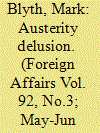

|
|
|
|
|
| Publication |
2013.
|
| Summary/Abstract |
The results of Europe's experiment with austerity are in and they're clear: it doesn't work. Here's how such a flawed idea became the West's default response to financial crises.
|
|
|
|
|
|
|
|
|
|
|
|
|
|
|
|
| 3 |
ID:
118634
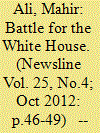

|
|
|
| 4 |
ID:
096930


|
|
|
|
|
| Publication |
Princeton, Princeton University Press, 1991.
|
| Description |
xiv, 326p.
|
| Standard Number |
0691078645
|
|
|
|
|
|
|
|
|
|
|
|
Copies: C:1/I:0,R:0,Q:0
Circulation
| Accession# | Call# | Current Location | Status | Policy | Location |
| 055232 | 973.92/SHA 055232 | Main | On Shelf | General | |
|
|
|
|
| 5 |
ID:
127913
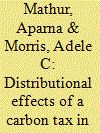

|
|
|
|
|
| Publication |
2014.
|
| Summary/Abstract |
This paper analyzes the distributional implications of an illustrative $15 carbon tax imposed in 2010 on carbon in fossil fuels. We analyze its incidence across income classes and regions, both in isolation and when combined with measures that apply the carbon tax revenue to lowering other distortionary taxes in the economy. Consistent with earlier findings, we find that a carbon tax is regressive. Using tax swap simulations, we then subtract the burden of other taxes the carbon tax revenue could displace, and compute the net effect on households under three assumptions about how capital and labor income might be distributed.
|
|
|
|
|
|
|
|
|
|
|
|
|
|
|
|
| 6 |
ID:
171107
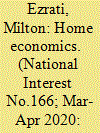

|
|
|
|
|
| Summary/Abstract |
Polls show a common complaint; that the system is rigged in favor of a self-serving business and government elite. While the public Cannot identify exactly how the system is rigged, it is nonetheless correct; elites in business and government collude regularly to run the American economy to their own advantages and have increasingly done so for decades.
|
|
|
|
|
|
|
|
|
|
|
|
|
|
|
|
| 7 |
ID:
086298
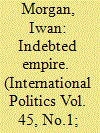

|
|
|
|
|
| Publication |
2008.
|
| Summary/Abstract |
America is like no other dominant power in modern history because it depends on other countries for capital to sustain its military and economic dominance. The US current-account deficit, comprised primarily of the trade deficit and interest payments on America's external debt to foreign investors, has ballooned since 1997 to reach an annual rate in excess of 6 percent in mid-2005. The US is tied into a co-dependency with Asian countries, which fund its borrowing in order that their export-driven economies have the benefit of competitive exchange rates to sell their goods to Americans. Although some analysts have characterized this relationship as Bretton Woods 2, it is inherently unstable. The US requires Asian countries to continue purchasing massive quantities of dollar reserves but their capacity and need to do so are finite. When Asia stops buying dollars, the American economy will experience problems that will have implications for America's global power. To avert this risk, the US needs to reduce its own governmental budget deficit and promote international agreement for currency and other economic adjustments that can help to rebalance trade flows.
|
|
|
|
|
|
|
|
|
|
|
|
|
|
|
|
| 8 |
ID:
138044
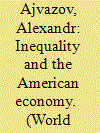

|
|
|
|
|
| Summary/Abstract |
Economic inequality in the US and most countries has risen sharply in the last few decades. This article analyses the process that accounts for the growing concentration of capital and draws paralles with the state of affairs which resulted in the great depression.
|
|
|
|
|
|
|
|
|
|
|
|
|
|
|
|
| 9 |
ID:
110086
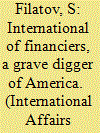

|
|
|
|
|
| Publication |
2011.
|
| Summary/Abstract |
LATE IN JUNE, the U.S. Congress treated the world to a fight between the Republican and Democratic deputies and the Obama Administration over the debt ceiling. The world responded with different assessments of what it had seen: political struggle; a Hollywood soap opera with an inevitable happy ending; an attempt at rescuing American economy or at blackmailing the world markets; some people suspected that this was an outcrop of the eternal confrontation between the American industrial and financial lobbies.
|
|
|
|
|
|
|
|
|
|
|
|
|
|
|
|
| 10 |
ID:
118605
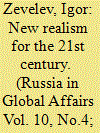

|
|
|
|
|
| Publication |
2012.
|
| Summary/Abstract |
Most experts agree that the Chinese economy will surpass the American economy in terms of absolute GDP within the next ten years. This change will occur within the tenure of the current political administration in Beijing, which came to power in November 2012. In the meantime, the United States will remain the strongest power militarily and retain its preeminence in the spheres of science, education, technological development and innovations. Over time, we will enter a fundamentally new epoch of world history, characterized by diversification of leadership in various fields amongst a large number of countries. Does Russia have a foreign policy strategy which can prepare it for these international changes? And how should Russia react to the growing competition between the U.S. and China today?
|
|
|
|
|
|
|
|
|
|
|
|
|
|
|
|
| 11 |
ID:
098239
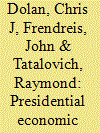

|
|
|
| 12 |
ID:
115600


|
|
|
|
|
| Publication |
2012.
|
| Summary/Abstract |
We have learned time and again in history that arming opposition forces, while improving their chances in the near term, can militarize and divide a society in ways detrimental to its recovery.
|
|
|
|
|
|
|
|
|
|
|
|
|
|
|
|
| 13 |
ID:
124753
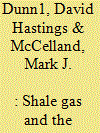

|
|
|
|
|
| Publication |
2013.
|
| Summary/Abstract |
The spectre of American decline is once again animating both observers and practitioners of US foreign policy. The global financial crisis, a faltering American economy and continued costly and controversial military engagements overseas have been presented as conclusive proof that American foreign policy will soon lack the resources needed to sustain its previous international hegemony. Arguments of domestic weakness have been linked to analyses of the economic vitality of America's competitors to demonstrate a seemingly watertight case for relative decline. The inexorable rise of China has been presented from various quarters as evidence that the American era will soon be drawing to a close. Yet, such declinist arguments continue to suffer from fundamental weaknesses, overestimating the likely future strength of America's rivals while concurrently downplaying the capacity of the US to rejuvenate its economy and thus revivify its liberal universalist creed. The most interesting development in this regard has been the sudden resurgence of the US energy sector. Written off less than a decade ago as being in terminal decline, the American oil and gas industry has staged a remarkable recovery. Vast reserves of shale gas and accompanying tight oil offer the potential to aid the revival of the American economy, with some forecasts pointing to US energy self-sufficiency within two decades. Notions of US relative decline may yet prove premature. The geopolitical impact of American energy self-sufficiency is likely to be very significant, making an important contribution to a reversal of the US trade deficit, a revival of America's industrial base, and the possibility of a corresponding relative decline in power for conventional fossil fuel exporters.
|
|
|
|
|
|
|
|
|
|
|
|
|
|
|
|
| 14 |
ID:
124707
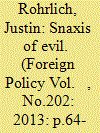

|
|
|
|
|
| Publication |
2013.
|
| Summary/Abstract |
From Pepsi in Prague to Hershey bars in Hong Kong, American snack-makers enjoy a de facto oligopoly on global junk-food consumption. But what do snackers in U.S.-sanctioned countries eat when they get peckish? To find out, I embarked on a global scavenger hunt of sorts, collecting candy, chips, and soda that you won't find in American stores -- sometimes straight from the source (a recent reporting trip to Cuba) and sometimes by way of friends, acquaintances, and strangers around the globe. I enlisted New York Times food writer and bestselling author Mark Bittman to sample my collection of "enemy" snacks, which ranged from the mildly exotic to the blatantly imitative. Here are Bittman's tasting notes -- and a few words of warning.
|
|
|
|
|
|
|
|
|
|
|
|
|
|
|
|
| 15 |
ID:
085959


|
|
|
|
|
| Publication |
2009.
|
| Summary/Abstract |
Before he was sworn in as President, Barak Obama began to lay out his plans for reviving an American economy that, it would later be discovered, had declined 3.8 percent in the fourth quarter of 2008, its worst performance in 26 years.
|
|
|
|
|
|
|
|
|
|
|
|
|
|
|
|
| 16 |
ID:
045371
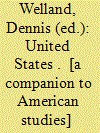

|
|
|
|
|
| Publication |
London, Methuen and Co Ltd, 1974.
|
| Description |
528p.hbk
|
| Series |
Methven's Companions to Modern Studies
|
| Standard Number |
416281508
|
|
|
|
|
|
|
|
|
|
|
|
Copies: C:1/I:0,R:0,Q:0
Circulation
| Accession# | Call# | Current Location | Status | Policy | Location |
| 013078 | 973/WEL 013078 | Main | On Shelf | General | |
|
|
|
|
| 17 |
ID:
112343
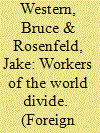

|
|
|
|
|
| Publication |
2012.
|
| Summary/Abstract |
Unions underwrote the affluence of U.S. workers in the last century. They ensured that manual work paid white-collar wages and gave laborers a voice in politics. But now, unions are declining, and the working and middle classes are paying the price. Reviving labor won't be easy -- but doing so is critical to preserving America's economic and social health.
|
|
|
|
|
|
|
|
|
|
|
|
|
|
|
|